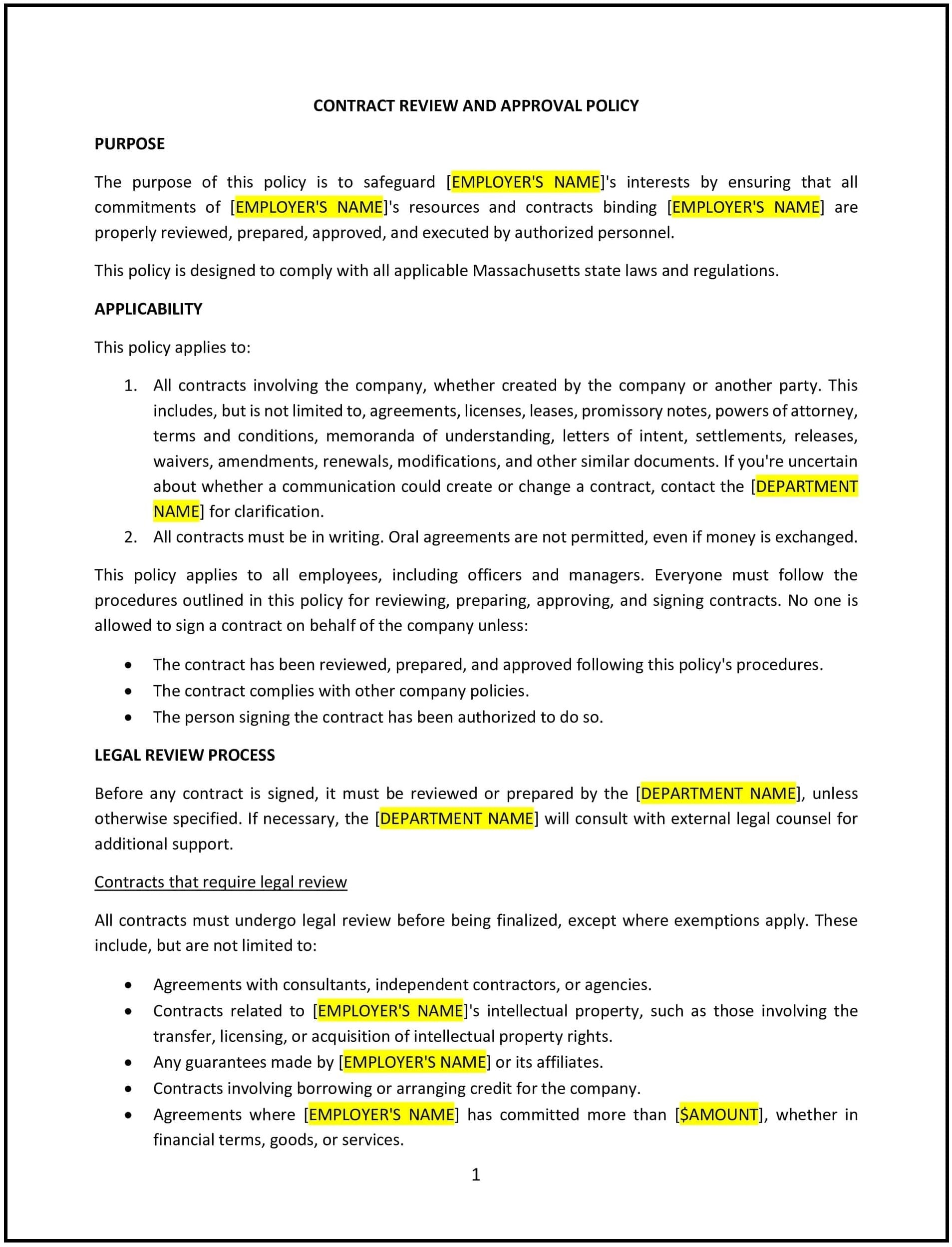Contract review and approval policy (Massachusetts): Free template
Got contracts to review? While you're here for policies, let Cobrief make contract review effortless—start your free review now.

Customize this template for free
This contract review and approval policy is designed to help Massachusetts businesses establish clear guidelines for reviewing and approving contracts to promote legal compliance, mitigate risks, and safeguard company interests. The policy outlines the steps employees must follow when drafting, reviewing, and finalizing contracts, including roles, responsibilities, and approval processes for various types of agreements.
By adopting this policy, businesses can ensure that contracts are consistent with company goals, meet legal requirements, and protect the business from potential liabilities.
How to use this contract review and approval policy (Massachusetts)
- Define the contract types: Specify the different types of contracts subject to review and approval, such as vendor agreements, employment contracts, partnership agreements, non-disclosure agreements (NDAs), and service agreements. The policy should outline whether all contracts, regardless of type or value, require review and approval.
- Establish approval levels: Define the approval levels for different types of contracts. For example, low-value contracts may require approval from department heads, while high-value or complex contracts may need approval from senior management or legal counsel.
- Identify responsible parties: Specify the roles and responsibilities of individuals involved in the contract review process. This includes who is responsible for drafting, reviewing, and approving contracts at each stage of the process, including legal, financial, and executive staff.
- Outline the review process: Set clear guidelines for the review process, including who will review the contract, what areas should be examined (e.g., legal terms, payment schedules, termination clauses, confidentiality clauses), and how discrepancies or concerns should be addressed.
- Set timelines for approval: Specify the timeline for reviewing and approving contracts. The policy should set reasonable deadlines for the review process and highlight the importance of timely approvals to avoid business delays.
- Address contract amendments: Define the process for amending contracts once they have been signed. The policy should outline how amendments will be reviewed and approved, who will sign off on the amendments, and whether amendments require the same review process as the original contract.
- Ensure compliance with Massachusetts and federal laws: Ensure the policy complies with Massachusetts state laws, federal regulations, and industry-specific requirements regarding contracts. This may include compliance with the Massachusetts Uniform Commercial Code (UCC), the Fair Labor Standards Act (FLSA), and any other applicable laws.
Benefits of using this contract review and approval policy (Massachusetts)
This policy offers several benefits for Massachusetts businesses:
- Reduces legal risks: By ensuring that contracts are thoroughly reviewed and approved before signing, businesses can reduce the risk of entering into unfavorable or non-compliant agreements that could lead to legal disputes.
- Ensures consistency: The policy helps ensure consistency in contract terms and conditions, making it easier to standardize agreements and reduce the likelihood of errors or omissions.
- Promotes efficiency: By streamlining the contract approval process, the policy helps businesses move quickly while still ensuring that all necessary checks are in place.
- Protects company interests: The policy helps businesses safeguard their interests by ensuring that contracts align with the company’s goals, protect sensitive information, and comply with legal requirements.
- Enhances accountability: By defining clear roles and responsibilities for reviewing and approving contracts, the policy increases accountability and transparency in the process.
- Promotes compliance: By establishing clear procedures for contract review and approval, businesses can strengthen compliance with Massachusetts state laws and federal regulations, reducing the risk of legal or regulatory violations.
Tips for using this contract review and approval policy (Massachusetts)
- Communicate the policy clearly: Ensure all relevant employees, such as legal, procurement, and department managers, understand the contract review and approval process. This can be done through employee handbooks, training, or internal communication.
- Train employees on key clauses: Provide training on key contract clauses, such as termination, confidentiality, and indemnification, so that employees can spot potential issues and ensure that contracts are aligned with company policies.
- Implement digital tools: Consider using contract management software or digital tools to streamline the contract review and approval process, track contract status, and maintain records of approvals.
- Prioritize high-risk contracts: For high-value or high-risk contracts, consider involving legal counsel early in the review process to ensure that all legal aspects are addressed and the contract is legally sound.
- Regularly audit the process: Periodically audit the contract review and approval process to identify areas for improvement, ensure compliance, and streamline workflows.
- Review and update regularly: Regularly review and update the policy to ensure it is compliant with Massachusetts state laws, federal regulations, and any changes in business practices.